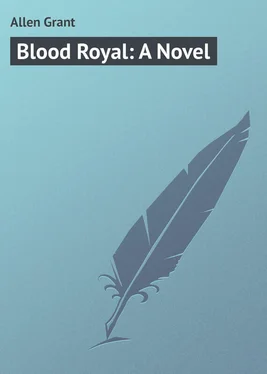Grant Allen - Blood Royal - A Novel
Здесь есть возможность читать онлайн «Grant Allen - Blood Royal - A Novel» — ознакомительный отрывок электронной книги совершенно бесплатно, а после прочтения отрывка купить полную версию. В некоторых случаях можно слушать аудио, скачать через торрент в формате fb2 и присутствует краткое содержание. Жанр: foreign_prose, на английском языке. Описание произведения, (предисловие) а так же отзывы посетителей доступны на портале библиотеки ЛибКат.
- Название:Blood Royal: A Novel
- Автор:
- Жанр:
- Год:неизвестен
- ISBN:нет данных
- Рейтинг книги:5 / 5. Голосов: 1
-
Избранное:Добавить в избранное
- Отзывы:
-
Ваша оценка:
- 100
- 1
- 2
- 3
- 4
- 5
Blood Royal: A Novel: краткое содержание, описание и аннотация
Предлагаем к чтению аннотацию, описание, краткое содержание или предисловие (зависит от того, что написал сам автор книги «Blood Royal: A Novel»). Если вы не нашли необходимую информацию о книге — напишите в комментариях, мы постараемся отыскать её.
Blood Royal: A Novel — читать онлайн ознакомительный отрывок
Ниже представлен текст книги, разбитый по страницам. Система сохранения места последней прочитанной страницы, позволяет с удобством читать онлайн бесплатно книгу «Blood Royal: A Novel», без необходимости каждый раз заново искать на чём Вы остановились. Поставьте закладку, и сможете в любой момент перейти на страницу, на которой закончили чтение.
Интервал:
Закладка:
Mr. Wells, laudably desirous of keeping well abreast with the educational movement of the present day, laid immense stress upon this absolute necessity for cram in the modern world. He even advised Richard to learn by heart the names and dates of all the English monarchs Dick could hardly forbear a smile at this naïve but well-meant proposal. He had worked hard at Modern History, both British and continental, in all his spare time, ever since he left the grammar school, and few men at the University knew as much as he did of our mediaeval annals. We are all for ‘epochs’ nowadays; and Dick’s epoch was the earlier middle age of feudalism. But the notion that anything so childish as the names and dates of kings could serve his purpose tickled his gravity not a little. Still, the advice was kindly meant, up to Mr. Wells’s lights, and Dick received it with grave courtesy, making answer politely that all these details were already familiar to him.
During the four days that remained before the trip to Oxford, Mr. Wells wouldn’t hear of Richard’s doing any more work in the shop than was absolutely necessary. He must spend all his time, the good man said, in reading Hume and Smollett – the latest historical authorities of whom the Chiddingwick bookseller had any personal knowledge. Dick availed himself for the most part of his employer’s kindness; but there was one piece of work, he said, which he couldn’t neglect, no matter what happened. It was a certain bookbinding job of no very great import – just a couple of volumes to cover in half-calf for the governess at the Rectory. Yet he insisted upon doing it.
Somehow, though he had only seen Mary Tudor once, for those few minutes in the shop, he attached a very singular and sentimental importance to binding that book for her. She was a pretty girl, for one thing – an extremely pretty girl – and he admired her intensely. But that wasn’t all; she was a Tudor, as well, and he was a Plan-tagenet. In some vague, half-conscious way he reflected more than once that ‘it had gone with a Tudor, and with a Tudor it might come back again.’ What he meant by that it he hardly knew himself. Certainly not the crown of this United Kingdom; for Dick was far too good a student of constitutional history not to be thoroughly aware that the crown of England itself was elective, not hereditary; and he had far too much common-sense to suppose for one moment that the people of these three realms would desire to disturb the Act of Settlement and repeal the Union in order to place a local dancing-master or a bookseller’s assistant on the throne of England – for to Scotland he hadn’t even the shadowy claim of an outside pretender. As he put it himself, ‘We were fairly beaten out of there once for all by the Bruce, and had never at the best of times any claim to speak of.’ No; what he meant by It was rather some dim past greatness of the Plantagenet family, which the bookseller’s lad hoped to win back to some small extent in the noblest and best of all ways – by deserving it.
The days wore away; Stubbs and Freeman were well thumbed; the two books for Mary Tudor were bound in the daintiest fashion known to Chiddingwickian art, and on the morning of the eventful Wednesday itself, when he was first to try his fate at Oxford, Dick took them up in person, neatly wrapped in white tissue-paper, to the door of the Rectory.
Half-way up the garden-path Mary met him by accident. She was walking in the grounds with one of the younger children; and Dick, whose quick imagination had built up already a curious castle in the air, felt half shocked to find that a future Queen of England, Wales, and Ireland ( de jure ) should be set to take care of the Rector’s babies. However, he forgot his indignation when Mary, recognising him, advanced with a pleasant smile – her smile was always considered the prettiest thing about her – and said in a tone as if addressed to an equal:
‘Oh, you’ve brought back my books, have you? That’s punctuality itself. Don’t mind taking them to the door. How much are they, please? I’ll pay at once for them.’
Now, this was a trifle disconcerting to Dick, who had reasons of his own for not wishing her to open the parcel before him. Still, as there was no way out of it, he answered in a somewhat shamefaced and embarrassed voice: ‘It comes to three-and-sixpence.’
Mary had opened the packet meanwhile, and glanced hastily at the covers. She saw in a second that the bookseller’s lad had exceeded her instructions. For the books were bound in full calf, very dainty and delicate, and on the front cover of each was stamped in excellent workmanship a Tudor rose, with the initials M. T. intertwined in a neat little monogram beneath it. She looked at them for a moment with blank dismay in her eye, thinking just at first what a lot he must be going to charge her for it; then, as he named the price, a flush of shame rose of a sudden to her soft round cheek.
‘Oh no,’ she said hurriedly. ‘It must be more than that. You couldn’t possibly bind them so for only three-and-sixpence!’
‘Yes, I did,’ Dick answered, now as crimson as herself. ‘You’ll find the bill inside. Mr. Wells wrote it out. There’s no error at all. You’ll see it’s what I tell you.’
Mary fingered her well-worn purse with uncertain fingers.
‘Surely,’ she said again, ‘you’ve done it all in calf. Mr. Wells can’t have known exactly how you were doing it.’
This put a Plantagenet at once upon his mettle.
‘Certainly he did,’ Dick answered, almost haughtily. ‘It was a remnant of calf, no use for anything else, that I just made fit by designing those corners. He said I could use it up if I cared to take the trouble. And I did care to take the trouble, and to cut a block for the rose, and to put on the monogram, which was all my own business, in my own overtime. Three-and-sixpence is the amount it’s entered in the books for.’
Mary gazed hard at him in doubt. She scarcely knew what to do. She felt by pure instinct he was too much of a gentleman to insult him by offering him money for what had obviously been a labour of love to him; and yet, for her own part, she didn’t like to receive those handsome covers to some extent as a present from a perfect stranger, and especially from a man in his peculiar position. Still, what else could she do? The books were her own; she couldn’t refuse them now, merely because he chose to put a Tudor rose upon them – all the more as they contained those little marginal notes of ‘localities’ and ‘finds’ which even the amateur botanist prizes in his heart above all printed records; and she couldn’t bear to ask this grave and dignified young man to take the volumes back, remove the covers on which he had evidently spent so much pains and thought, and replace them by three-and-sixpence worth of plain cloth, unlettered. In the end she was constrained to say frigidly, in a lowered voice:
‘They’re extremely pretty. It was good of you to take so much trouble about an old book like this.
There’s the money; thank you – and – I’m greatly obliged to you.’
The words stuck in her throat. She said them almost necessarily with some little stiffness. And as she spoke she looked down, and dug her parasol into the gravel of the path for nervousness. But Richard Plantagenet’s pride was far deeper than her own. He took the money frankly; that was Mr. Wells’s; then he answered in that lordly voice he had inherited from his father:
‘I’m glad you like the design. It’s not quite original; I copied it myself with a few variations from the cover of a book that once belonged to Margaret Tudor. Her initials and yours are the same. But I see you think I oughtn’t to have done it. I’m sorry for that; yet I had some excuse. I thought a Plantagenet might venture to take a little more pains than usual over a book for a Tudor. Noblesse oblige .’
Читать дальшеИнтервал:
Закладка:
Похожие книги на «Blood Royal: A Novel»
Представляем Вашему вниманию похожие книги на «Blood Royal: A Novel» списком для выбора. Мы отобрали схожую по названию и смыслу литературу в надежде предоставить читателям больше вариантов отыскать новые, интересные, ещё непрочитанные произведения.
Обсуждение, отзывы о книге «Blood Royal: A Novel» и просто собственные мнения читателей. Оставьте ваши комментарии, напишите, что Вы думаете о произведении, его смысле или главных героях. Укажите что конкретно понравилось, а что нет, и почему Вы так считаете.












